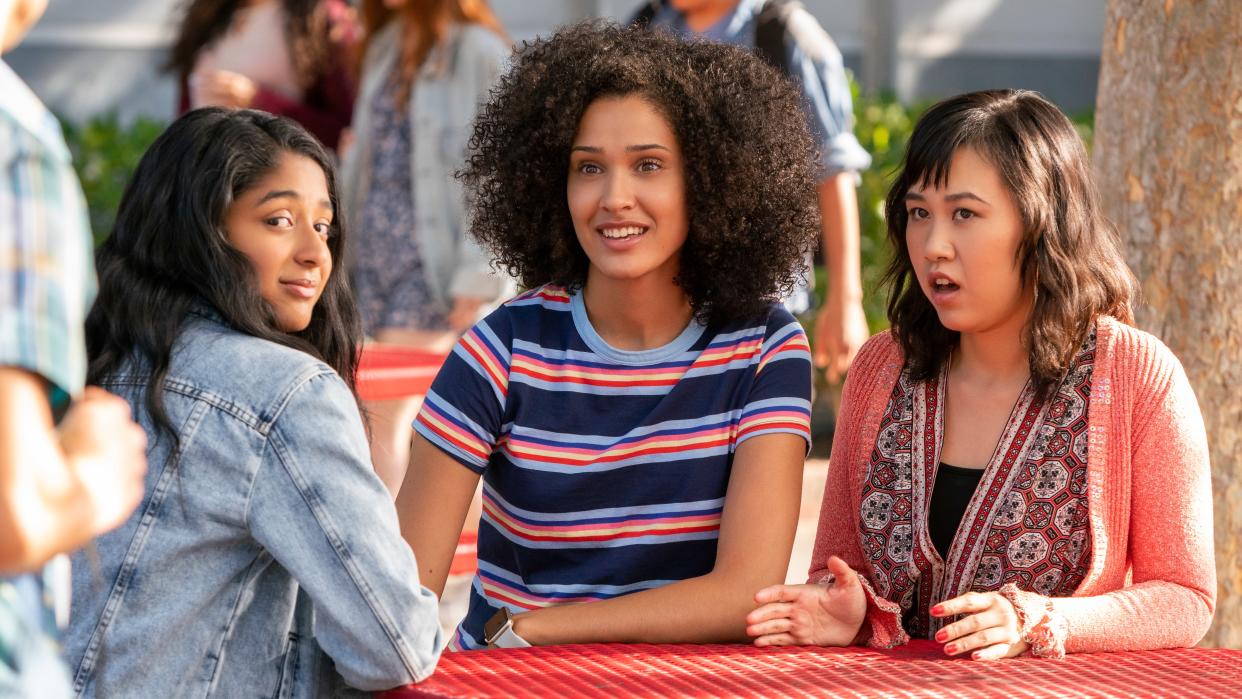Mindy Kaling's "Never Have I Ever" Is a Love Letter to Nerdy Girls of Color

Minor spoilers for Netflix's Never Have I Ever ahead.
With the upcoming Netflix comedy Never Have I Ever, Mindy Kaling provides a more nuanced depiction of nerdy, high-achieving teens, particularly ones that are young women of color with their own set of ambitions and insecurities.
“Nerds are not only the wallflowers and the quiet ones,” Mindy recently said at a junket, who created the series and serves as an executive producer. “We’re ambitious, we have obnoxious personalities sometimes, we want to have sex and dream like all the other kids.”
Who better to depict this layered reality than a woman who grew up wrestling with wants that sometimes felt at odds with her Indian heritage and very American interests and pursuits — a studious, first-generation Indian American teenage girl? Still, while the show certainly draws inspiration from Mindy’s personal experiences, Never Have I Ever follows a decidedly unique story arc with Devi, a 15-year-old Indian American girl striving and surviving in the wake of her father’s death.
“I think that a lot of the character herself is so spunky and confident and says out loud what she wants in a way that I was never like, but I do think that her desires and her insecurities are really similar to mine,” Mindy said.
While Devi’s at once an overachieving, high school sophomore, there’s an impatience with her classmates, her teachers—with anything keeping her from her goals—that bubbles just beneath the surface. The adolescent neither compromises her relentless pursuit of academic success nor her desire to have sex for the first time with class hottie Paxton. Despite a lighthearted and sometimes chaotic approach, her hunger for both is palpable. Her character exists firmly in the present moment, a nerd that has more in common with the girls of *Booksmart* than the tropey, sexless representations of nerds of yore.
“Growing up shows that had the most nuanced depictions of teenagers were My So-Called Life and then, The Breakfast Club, and so if you’re watching that, even with the most nuanced depictions it’s an all-white cast it’s like, ‘well, who am I, Ally Sheedy? Emilio Estevez?’” Mindy said. “I felt really lucky to be able to do a show about an Indian nerd who's also badly behaved, to show that because I’m deeply familiar with it.”
It’s this kind of subtle yet highly specific detailing that adds true-to-life color not only to Devi’s nerdiness, but it's also in the fabric of the relationship she has with her Indian heritage. At the very outset, Mindy cast newcomer Maitreyi Ramakrishnan in the lead role by taking to her own social accounts to host an open casting call. This was an attempt to circumvent usual talent pipelines, which privilege actors from certain cities, racial and economic backgrounds. Through her we see a modern teenage girl explore parts of her culture and not others, getting schooled by relatives on things like internalized racism and learning to appreciate one’s own background while developing crushes on white guys in class.
Authenticity is present too, in artful ways the show engages with colorism and competition among immigrants and first-generation Americans. Even the show’s Ferris Bueller-style narrator, tennis legend John McEnroe, is a nod to the ways immigrant parents latch onto pop icons as cultural touchstones to relate to their kids. Devi is very specifically a young nerd of color.
“That’s what’s so puzzling to me because you don't see nerds of color on TV. But that is exactly what [highs school] was like. My Asian American and African American friends were nerds,” Mindy said. “There's been so many white creators who've done these indelible images of nerds. Think of the Superbad poster. But I was looking at most of the kids in all my honors and AP classes [who were] of color, but we haven't seen them.”
Beyond the usual chaos of teen drama, the show is also about a girl who lost her father, and it handles the topic with an air of lightness. Mindy grounded the character as authentically as possible.
“We had a ton of research on this and was something that a psychologist that we met said would be the way that she would experience these clashes, which eventually became pretty funny,” she said. “I've done confident characters, but I haven't done one who has to see themselves through trauma.”
It’s a testament to the importance of having a woman of color, a first-generation American as a creator. By centering Devi as a lead, rather than relegating her to a sidekick, there’s a huge opportunity to show layers of comedy and darkness with deft richness, and it’s because of access to lived experiences and cultural nuance. It makes things like grief, anxiety, and the chaos of teenage life sparkle with humor in a way that rings true—because it is.
Related: New on Netflix April 2020: Never Have I Ever, Community Seasons 1-6
Originally Appeared on Teen Vogue


